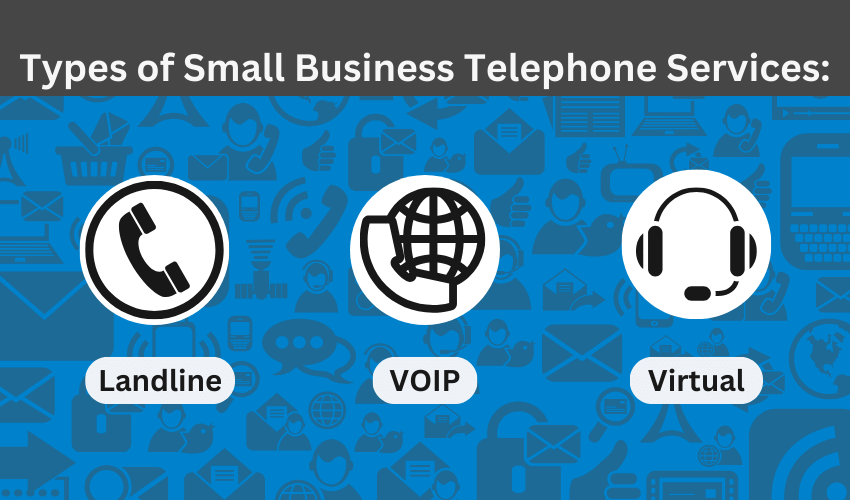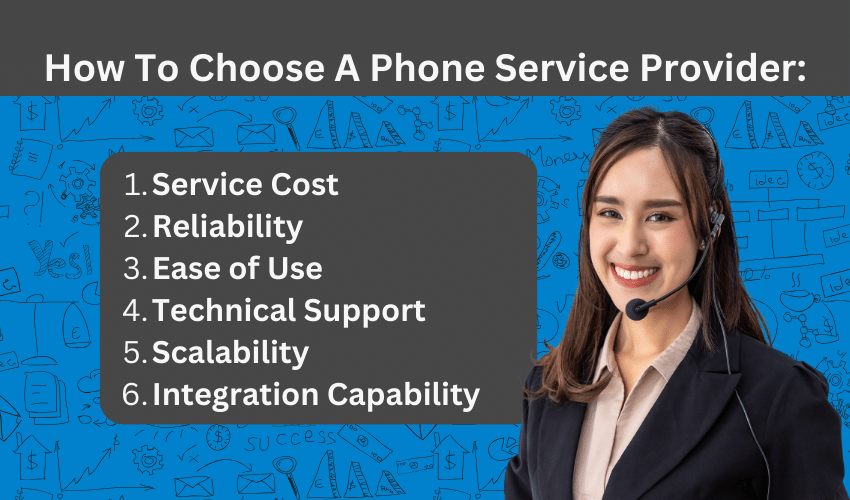
What is Call Center Compliance? Why It Matters in 2024
Ensure your call center operations meet stringent laws and standards with our expert insights on call center compliance. Stay compliant and avoid costly penalties.
Phone Service USA - Small Business - Mastering Small Business Success: How to Choose a Telephone Service in 2024
In our digitally dominated world, it’s easy to overlook things that might seem old-fashioned or irrelevant. Small business telephone services can fall into that category as more modern communication channels like email and social media take precedence. However, this ignores a vital fact: well-organized telephone systems remain a cornerstone of effective business communication.
Also Read:

An efficient communication system is a cornerstone to the successful running of any small business. It serves as a bridge that connects your business to its clients, vendors, and employees. Here’s how reliable business telephone services are essential in propelling your enterprise toward growth and profitability.
Think about the last time you had a pleasant phone conversation with stellar customer service. Didn’t it make you feel appreciated? Now imagine offering your customers the same experience through proficient handling of calls – cultivating relationships is crucial to sustaining a successful venture.
Investing in the best small business phone service ensures premium quality interactions and paves the way for establishing trust and loyalty among clients – these are invaluable assets for any small entrepreneurial outfit.
Time saved equals money earned, or so they say. That mainly correlates to quick, effective telecommunications channels. The faster you can communicate with clients or within teams internally, the quicker tasks get accomplished, leading to increased productivity.
Employing a robust small business phone system reduces call drop rates significantly. This ultimately minimizes potential revenue loss due to missed connections or interrupted communications.
First impressions count—it’s an undeniable fact. One fundamental way businesses create lasting first impressions is via their communication platforms. Reliable business telephone services offer numerous features like professional greetings, on-hold music, and voicemail services, pillars of professionalism in customer service.
These attributes may seem trivial but can play a determining factor in acquiring new customers or losing them to competitors offering similar products or services when implemented correctly.
There’s much truth in considering communication as one of your most powerful tools; it either makes or breaks your enterprise—the importance couldn’t be more stressed!

Have you ever wondered what type of telephone service would best cater to the needs of your small business? For effective communication, understanding the most suitable type is crucial. Three common types are Traditional Landline Services, VoIP, and Virtual Phone Solutions.
Call them old-fashioned or timeless, but traditional landlines still have a place in many small offices. These systems employ copper lines for call transmission and offer high-quality voice clarity. An on-site PBX (Private Branch Exchange) system is required to manage multiple lines, call transfers, extensions, and everything else one might expect from a phone set up in an office environment. While they offer stability and familiarity, these services might not be ideal if you’re looking for something cost-effective or forward-leaning as it lacks advanced modern features.
Voiced over Internet Protocol (VoIP) constitutes our next category. Its recent emergence brought a significant shift in business communications through groundbreaking technological advances. Unlike its conventional counterparts that rely on physical networks, Internet phone systems use the internet to connect callers.
This form of communication has become increasingly popular among smaller businesses because it’s feature-rich yet affordable. It enables cloud faxing, computer integration to make calls via laptop or desktop computers, and automated attendants who direct calls off-hours—just the starter benefits! It’s light years ahead compared to traditional techniques and could be precisely what your business needs.
Finally comes virtual phone solutions—a perfect pick for teams that operate remotely or require considerable mobility as part of their work routine. This alternative covers companies that do not want physical phones and prefer software-based solutions that can work on any device with an internet connection.
Yes, you heard right! You can answer a business call from your mobile phone without revealing your number. Also, this arrangement allows remote employees to be part of the office phone system effortlessly while providing client-facing professional service with features like automated receptionists and custom greeting messages.
Each business has unique needs; therefore, there isn’t a one-size-fits-all when selecting small office phone systems. Evaluating the nature of your operations is critical in determining which telephone services are best for your small business.

A few standout features are non-negotiable when choosing the best small business phone system. Notably, scalability and flexibility, integration with other business applications, and mobile accessibility mark a high-quality and effective telecom solution designed with your growing enterprise in mind.
The lifespan of your company’s telephone services should align with your overall business plans: growth and expansion. A static phone system that provides little room for adjustment could eventually become more of a hindrance than an asset as your communication needs evolve. However, with technologies like cloud-based solutions, scaling up—or down—is a simple process.
Additionally, flexibility is critical when evaluating potential telecom services. What happens if you open another office or need additional lines sporadically throughout the year due to seasonal fluctuations? These scenarios call for flexible solutions, such as Virtual Phone System Solutions or VoIP Services – which adapt quickly to changing needs.
Remember: Choosing a service that offers flexibility and scalability can significantly simplify future transitions while ensuring you only pay for what you use.
In today’s digital age, streamlined business operations rely heavily on various software integrations, especially within communication processes. The ideal small business phone system should integrate smoothly with existing platforms already used within your company.
Such seamless integration reduces friction in workflow by having all information readily accessible from one interface—eliminating application jumping—for tasks like checking voicemails or engaging customer relationship management (CRM) tools.
Look for providers offering compatibility with popular office suites like Microsoft Office 365 or collaborative tools such as Slack; this way, your team doesn’t need to switch platforms continually.
Finally, accessibility plays a significant role in modern businesses’ day-to-day operations—an increasingly important aspect given the trend towards remote workforces post-COVID-19 pandemic. Mobile-friendly features enable employees to work efficiently from anywhere without missing a beat.
A good telephone service will offer features like call forwarding, voicemail-to-email transcription, and dedicated business numbers usable on personal mobile devices, ensuring seamless communication regardless of employees’ locations.
Mobile features also extend to proprietors who could manage their system remotely—a crucial tool for those unexpected moments when adjusting call settings or viewing analytics outside the office.

When comparing business phone systems for your small enterprise, not all options are created equal. There’s a plethora of factors that can make or break your choice. Here, we delve into several vital considerations that should guide your decision-making process.
Before finalizing any decision related to telephone services for your small business, ensure you perform diligent research comparing various providers side by side based on these factors, amongst others – considering all aspects critically before deciding which system integrates best within your specific operational setup can save you on cost, time and avoidable hassles in the future.

Step-by-step, let’s dive into the latest trends shaping telephone services—the beginning of your future-proof communication strategies. The future of small business telephony isn’t bound by cords or confined within office walls anymore; it’s on the cloud, mobile, and even integrating Artificial Intelligence (AI) capabilities.
Voice over Internet Protocol (VoIP) is rapidly gaining ground. Openreach, a communications company based in the UK, even plans to retire its traditional landline services by 2025 completely. With an ability to service calls over the internet instead of conventional phone lines—offering lower costs and versatile digital features—it’s no surprise that many businesses are embracing this shift
Artificial intelligence is stepping into small business telephone systems, adding another layer of revolution. From intuitive auto-attendants redirecting incoming calls to precise voicemail transcribing software—AI simplifies usability, boosts productivity, and delivers unparalleled customer experiences.
Mobile communications are more than just a trend—they’re a necessity. Today’s workforce needs mobility, making solutions that offer smartphone integration more prevalent than ever. You ensure uninterrupted communication irrespective of location constraints by allowing employees to receive client calls directly on their devices through dedicated applications.
Thanks to advancements in cloud technology, storing data off-site has become safer and more accessible than ever before—an attractive proposition for smaller enterprises looking for cost-efficient ways to handle large volumes of call data securely.
In 2024, small businesses are discovering that effective telephony involves more than just embracing new technologies. While advancements in VoIP, AI, and cloud-based systems are essential, the fundamental principles of telephony remain crucial. Robust phone systems for small businesses help build better customer relationships by ensuring high-quality interactions, which fosters trust and loyalty. These systems are also essential in improving productivity by providing efficient communication channels that accelerate task completion and reduce revenue loss caused by missed connections.
Professionalism in communication is still crucial, so features such as professional greetings and voicemail services are essential in creating lasting first impressions. The choice between traditional landlines, advanced VoIP, and virtual phone solutions depends on the unique needs of each business, balancing cost, ease of use, and technical support. Scalability, integration with existing business applications, and mobile accessibility are essential features in any small business telephone service, ensuring that the chosen solution grows with the business and aligns with its evolving communication needs.
In conclusion, small businesses are adopting new technologies and redefining their communication strategies to blend traditional values with modern solutions, ensuring they remain connected, efficient, and competitive in a digital-first marketplace.

Ensure your call center operations meet stringent laws and standards with our expert insights on call center compliance. Stay compliant and avoid costly penalties.

Improve customer retention by showing appreciation. Reward loyalty and keep customers coming back with proven strategies that strengthen relationships.

VoIP technology is revolutionizing the telecom industry. Learn about its transformative journey and how it benefits your communication needs!